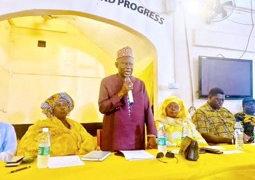
The initiative that sought to promote a healthier information space with the development and implementation of indicators for trustworthiness of journalism was coordinated by the Gambia Press Union (GPU).
The Gambia is the first English speaking country in Africa to be introduced to this initiative, which is also designed to promote and reward compliance with professional norms and ethics.
The Journalism Trust Initiative (JTI) is a market-driven solution aimed at promoting the credibility of quality journalism and transforming it into a tangible competitive advantage.
The daylong convergence also sought to highlight the importance of adopting the JTI for media publishers and managers in The Gambia and outline the incentives and benefits it offers. The JTI provides an inclusive transparency and compliance tool applicable to newsrooms of all sizes and types worldwide.
By conforming to the JTI standards, media outlets can optimise their editorial processes, performance and ethical conduct - giving them a competitive edge. This initiative allows media houses to engage in trustworthy journalism, to stand out from the competition, and to be recognised as one of the most credible media sources globally.
The JTI also enables consumers and citizens, regulators, investors, donors and the private sector, like advertisers and distributors, to identify and reward trustworthy journalism; and contributes to a healthier information space at large with an independent, transparent, systemic and potentially game-changing, self-regulatory mechanism.
As a one-of-a-kind official ISO-type Standard, the JTI is certifiable by means of optional third-party audits, and it is machine-readable to feed into algorithmic indexation and recommender systems (social media feeds, search ranks, programmatic advertising) to enhance visibility, and eventually sustainability, of trustworthy sources of information.
Declaring the event open, Information Minister Lamin Queen Jammeh described the role of journalists as “very critical” and very much needed.
“Individually and collectively, as you perform what would be very important is the quality of service that you deliver to the people.”
“The more qualitative publications you give; the more professional you are in your undertaking; the better the long term would provide for your papers.
He described the meeting as a direct opportunity to build credentials that would survive the test of time.
“As far as the government of The Gambia is concerned, the policy to the media is the requirement for the existence of democratic society,” he said.
“The government under the leadership of President Adama Barraw has committed itself in ensuring that The Gambia is democratic,” adding that will be inherited by generations to come.
Sadibou Marong, RSF’s Sub-Saharan African Office head, revealed JTI has currently one certified media in Africa based in Niger and is expecting more than 15 others in different countries in Africa.
RSF has noted The Gambia’s “positive” press ranking as the country is ranked among best five countries in Africa and 46 in the world – saying this is “historic gain” to maintain.
“RSF is equally engaging the Ministry of Information to secure Gambia’s participation in the partnership of information and democracy,” explaining that it’s an intergovernmental agreement endorsed by 15 countries around the world and championed by RSF.
According to him, this is aimed at bringing democratic guarantees to the global space of information and communication, while ensuring freedom of expression.
Mr. Marong thus urged The Gambia to do its best to repeal some draconian laws that impede freedom of expression and strengthen economic environment for better media sustainability.
Pap Saine, the dean of RSF in Sub-Saharan Africa and co-publisher of The Point Newspaper, said RSF is playing a leading role in press freedom with 180 members.
Mr. Saine described Gambia’s performance in World Press Freedom ranking in past few years as impressive. “The Gambian has been doing remarkably well these years,” adding it was difficult under Jammeh.
“The press has done remarkably well under Barrow because there is no censorship. The government and press should work as partners and not enemies,” he stressed.
GPU Secretary General Modou Joof hailed RSF for the partnership, recalling this activity as first of its kind for the two institutions to work together directly.
He said that the GPU has been working tirelessly to ensure quality media content and promoting professionalism, citing this effort has led to the establishment of the Gambia Media Council (GMC). He added that the GPU has also been training Gambian journalists, editors and managers on ethical matters to ensure a more credible media content, while describing RSF initiative as a “worthy cause.”
Amie Bojang Sissoho, the director of Press and Public Relations at the Office of the President, also hailed RSF for the initiative.



